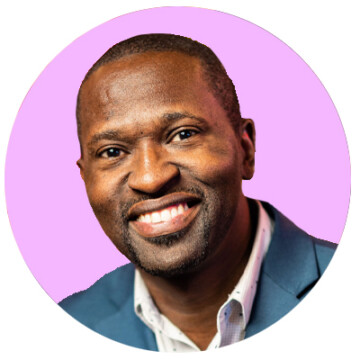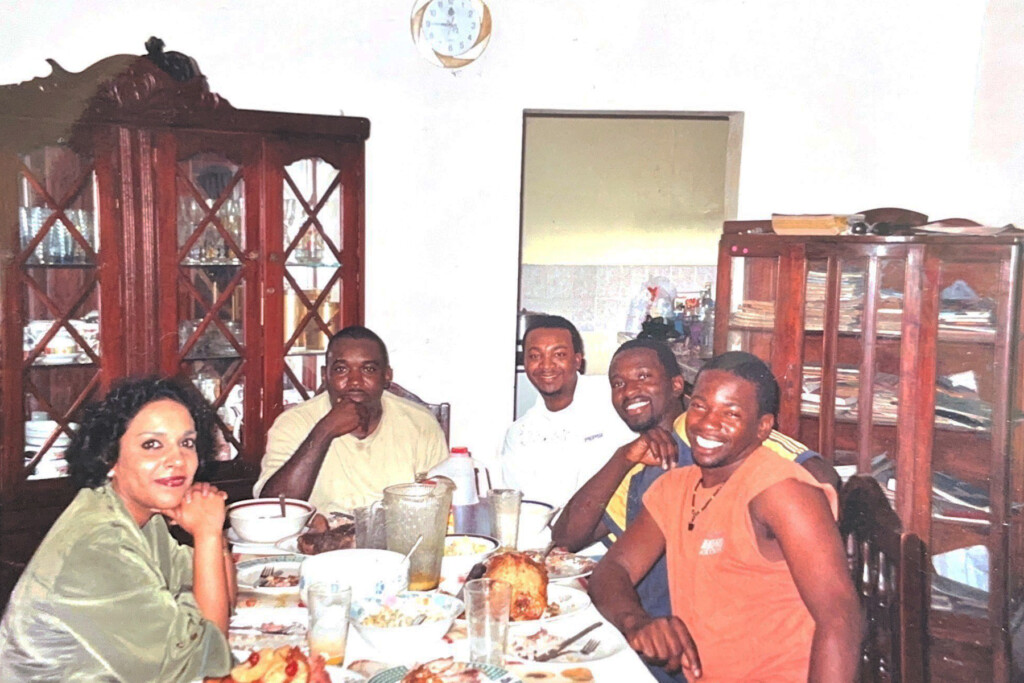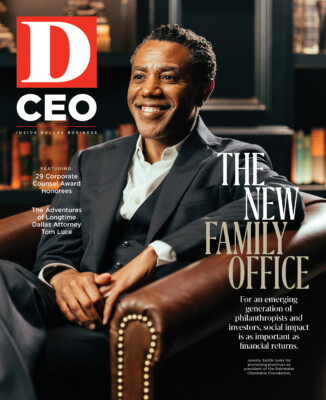
Growing up in Spanish Town, one of Jamaica’s poorest and most violent cities, Richard Thomas remembers traveling through gunfire on the way to school and witnessing a murder while playing soccer as a young boy. He left the island with only $150 to his name to pursue college in America, going on to spend about 15 years in consumer goods posts at Dean Foods, Borden Dairy Co., and more.
In 2010, Thomas launched Dallas-based The Present House Hospitality Group and has since expanded the company’s portfolio to include The Island Spot Jamaican Kitchen and Bar, The Island Spot Resort Villa in Jamaica, and Bone Daddy’s House of Smoke. He has big plans for his brand: “We would love to be at more than 30 operating units and $100 million in revenue over the next five to 10 years,” Thomas says.
Here, he shares more about his upbringing, founding his company, and more:
“I’m the youngest of four children. My father left when I was 9 and my mother owned a shop the size of a bodega, and she fed the community. By the time I was 5, I was running the calculations for the bodega. At 13, I was running the whole shop. Typically, in a poor community, people don’t go to the store and buy for the week, they buy for the day just to make ends meet. I didn’t realize I was an entrepreneur my whole life. In the store I learned what methods work and what methods don’t work. In Jamaica, I had to pay to take the exams to finish high school, so in order to make extra money to afford that, I started analyzing different trends in America. So, I bought candy, napkins, and snacks from America and shipped them to the store. I then went out into the community and sold them. I ended up making way more than I thought I would and that’s the first time I realized, ‘Hey, I can do this.’
“Spanish Town has multiple groups trying to fight each other. We’ve got people doing extortion, people doing shootings, and committing murders. We had certain areas that I had to pass through to get to school caught in the middle of everything. I’ve been shot at on the way to school. Not because I was in the middle of anything, but I was just having to pass through an area that was in a fight with another area, and my school happened to be on the other side of that.
“I was at a soccer game once playing soccer and somebody walked up and literally stabbed someone to death right in front of me and took a gun and started shooting at all of us and I took off running. So it is just one of those situations where I’ve seen people who were good and gifted, never actually live long enough to see their life reach the potential that it should. And that really bothered me. So, one of my personal long term goals is, I want to be able to go back to Jamaica and build a community development center, so that young kids can actually have an alternative to being on the streets. They need somewhere they can go and feel safe. They need a place where they can learn to be a kid because a lot of this violence that’s happening in Jamaica, it is not really grown men, these are young kids that are doing these things because they don’t really have an alternative.
“I came to America for the first time at 14 years old to visit, but Jamaica was home. By the time I was nearing the end of my high school days, a college recruiter came to my high school. I was the deputy head boy and also playing volleyball for the national team. My principal asked me to escort the recruiter around the school and meet some of the other kids. So I was doing that and having a conversation with her. She asked me if I had ever thought about coming to school in the U.S. I told her not really. She asked if I had ever taken the SATs, and I said, ‘yes.’ So, she asked me what my score was. I told her and she stopped and she looked at me and she said, ‘I can offer you a full academic scholarship to college right now.’ And she was serious. I told her yes! I literally took off running at top speed over a mile home to go tell my mom. I had no clue where [Benedict College in] Columbia, South Carolina, was but for a kid in Jamaica to say ‘I can go to America. Somebody will pay for my schooling and I get free room and board.’ That was just different.
“Some friends, who also came up as part of the same program, and I went to a restaurant within our first couple of weeks in Columbia. And we were sitting down but nobody was serving us. But we kept on talking, but after 10 to 15 minutes we started to get quiet and look around. Then somebody walked over to us and so we asked the man, ‘I see you keep walking around but why haven’t you stopped to serve us?’ He replied, ‘You’re foreigners we don’t serve your kind here.’ And that is one of my first memories of being in America.
“The first time I went to the super market I noticed shopping carts were scattered all over the parking lots. And these were the carts where you have to put quarters in to get the cart. So, every morning I woke up early and returned shopping carts to collect quarters—quarters in America were equivalent to $15 in Jamaica because our currency was so devalued. Then I started picking up soda cans and returning them for a nickel. It just made me realize that this is a culture of opportunities all over the place.”
Thomas went on to graduate from Benedict College, then earned his MBA from The Ohio State University. He was inspired to open his own Jamaican restaurant after a bad experience at one. “I was traveling the world as a consultant eating at all these fancy restaurants and never once thought about my own culture,” he says.
So, in 2009 Thomas opened his first The Island Spot restaurant in Carrollton. In 2016, he opened his second in Dallas. Now, coming soon to Farmers Branch is a third. It hasn’t all been smooth sailing. “I remember days where we would do, like $150 for the whole day,” he says. “Our first year, I think we did maybe $150,000 in sales.”
But in 2022, The Island Spot’s original Carrollton location did $1.3 million sales. Since getting his start, Thomas has erected The Present House Hospitality Group which recently acquired Bone Daddy’s. In 2022, with just a few months operating with the new barbecue asset, the holding group did $4.5 million in revenue. In 2023, Thomas expects to report around $15 million in revenue.
“My vision is to be a nine-figure company within the next 10 years,” Thomas says. “We’re going to expand The Island Spot across Texas and the entire Southeast toward Florida. Then we are looking at acquiring other concepts and we are looking at acquiring a Ft. Myers, Florida-based multi-unit restaurant brand. And we will be rolling out a relaunch of the Bone Daddy’s brand.”
Author






